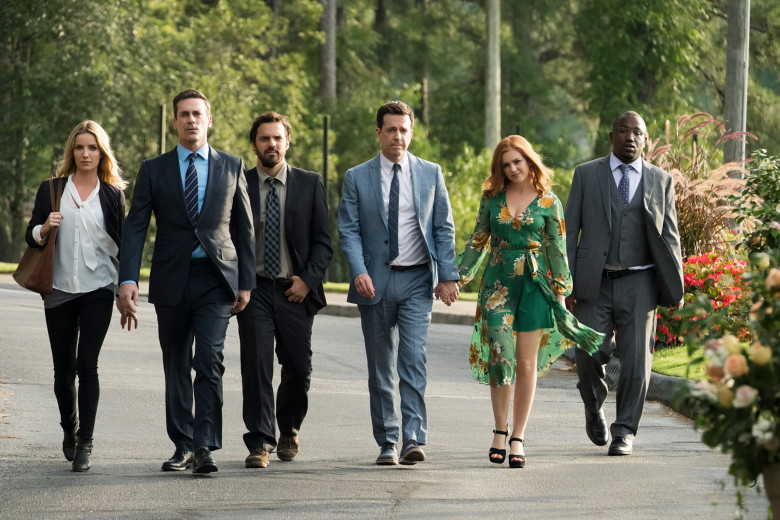 With any film that comes out now which celebrates American achievements you tend to fear the worst. Not for the content but for the underlying political issues that it may be trying to promote. Arguably there has not been a greater achievement in the twentieth century than man landing on the moon in 1969. It was a hard fought coup for the USA and one that is being resurrected by the current administration with their announcements for the forming of a space force with rather sinister overtones. First Man, the new film from Damien Chazelle, carefully avoids any such tone and instead gives us a personal profile of the first man on the moon.
With any film that comes out now which celebrates American achievements you tend to fear the worst. Not for the content but for the underlying political issues that it may be trying to promote. Arguably there has not been a greater achievement in the twentieth century than man landing on the moon in 1969. It was a hard fought coup for the USA and one that is being resurrected by the current administration with their announcements for the forming of a space force with rather sinister overtones. First Man, the new film from Damien Chazelle, carefully avoids any such tone and instead gives us a personal profile of the first man on the moon.
The film is not a straight up biography of Neil Armstrong but instead deals with the period from 1961 to the summer of 1969. At the start of the film we see how he deals with tragedy when he is faced with the fact that his young daughter is dying from a brain tumour and there is nothing he can do about it. This has an effect on his demanding job as a test pilot and after he starts to get over his loss he takes up a position in the newly formed astronaut program with NASA.
Rather than getting the full biography treatment we are presented with a fully formed adult who has opinions and responsibilities. The film and his motivations are formed by the passing of his child. Rather than tearing the family apart it makes them stronger as a unit despite Armstrong’s tendency to keep others at arms length. This may seem cold but it is a simple and effective defence mechanism. If you don’t get close to people then it is easier to deal with the bad times. As a test pilot and astronaut his career is filled with such events. As his wife points out one year saw the funeral of five friends and they got very good at them by the end.
 The story focuses on the man rather than the quest to win the space race. So instead of a bombastic and jingoistic film we get a rather quiet and interesting portrayal of how one man managed to navigate his way through the chaos of the program and the politics of the time. This is in part achieved by the intimate cinematography. There are a number of scenes that use shallow depth of focus to make the dialogue more intimate and in some cases seem smaller. It all plays into the basic story of a man rather than an achievement.
The story focuses on the man rather than the quest to win the space race. So instead of a bombastic and jingoistic film we get a rather quiet and interesting portrayal of how one man managed to navigate his way through the chaos of the program and the politics of the time. This is in part achieved by the intimate cinematography. There are a number of scenes that use shallow depth of focus to make the dialogue more intimate and in some cases seem smaller. It all plays into the basic story of a man rather than an achievement.
Gosling makes full use of his talent for minimal screen acting. There is little need to project Armstrong’s character with great speeches and outbursts. Instead, like the camera techniques, it is through his physical performance and presence that the audience gets a measure of the character. It is telling that there is only one scene where Armstrong shoes any real emotion and it is when he is completely alone. it’s is not the sign of a week man rather it is one who is deeply private and doesn’t want to be a burden on anyone else.
There are two major scenes where a rocket lift off are at the centre of the action. They are handled completely differently in terms of tone and spectacle. The first is the launch of the Gemini rocket and this whole sequence is shown from the perspective of the astronauts strapped into the cockpit. The camera never ventures outside of this cramped area and only moves to show the view that the men have as they are thrust into the sky. it emphasises the human element of the launch and gives a totally different view on the spectacle. The second sequence, towards the end of the movie, is more traditional in style with the scene cutting between the various elements of the launch in time with the countdown. it is fitting that this is the case as this is the moment that marked the start of the first trip to the moon. There is more history surrounding this and it feels right that it is treated in this way.
First Man is a surprising film in its lack of a political agenda. It is a personal drama that takes a great deal of care to emphasise the human elements of one of the major undertakings of the last century.
- Hugh Bonneville surprises young patients at Glasgow’s Royal Hospital for Children for MediCinema Screening of Paddington in Peru - November 7, 2024
- Portraits of Dangerous Women – Preview - November 7, 2024
- The Brutalist – Preview - November 6, 2024




